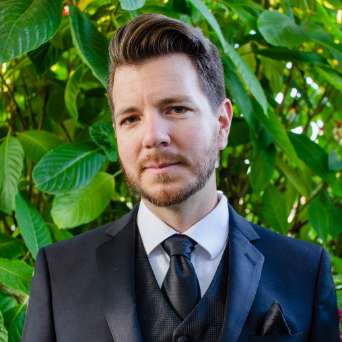Solo vocal recitals are always a marvel for me. Professional singers who excel at the format always astound me with the ease at which they deport their talents in such an exposed setting. In some ways, it can be the zenith of one’s artistry. At Disney Hall on Tuesday evening, we were treated to not one, but two of the most gifted recitalists of our day: Anne Sophie von Otter and Emanuel Ax. That the hall was, at most, half sold (with many sections completely closed) served to make the setting all the more intimate and the results were often breathtaking.
Ms von Otter’s resumé is distinguished. It is hard to believe that the esteemed singer has been on the international scene for over 25 years, and after all this time, her voice is in remarkable shape. Her distinctive mezzo is still so immediate in its communicativity and her solid technique makes her exceptional phrasing a model for all singers. For all of her operatic success, her strengths as a recitalist in Lieder are equally formidable. The statuesque von Otter is imposing onstage, yet completely natural in her deportment, at ease with meaningful gestures, and a knowing face. But that’s only half the artist.
The depth of understanding with which she commits herself to the music is exceptional. The vocal shading in her singing is all too telling of her intimacy with the music. While a whole recital of Brahms songs (with a few exceptions) may strike one as dangerously static, von Otter avoided this trap by inhabiting the songs’ subtle characterizations completely. She was able to dart from youthful and naïve in pieces such as “Juchhe!” and “Erlaube mir, feins Mädchen” to profound sorrow in “Auf dem Kirchofe,” and “Von ewiger Liebe”.
The evening’s concluding set of Zigeunermelodien was a different beast entirely. Von Otter sung them with an earthy abandon, digging into the rhythms with guttural effects yet an earnest manner that brought the beautiful simplicities of the text forms to the forefront. Tunes such as “Lieber Gott, du weist, wie oft bereut ich hab’” and “Röslein dreie in der Reihe blühn so rot” were sweetly and sincerely sung with a fervent “innigkeit”.
And it is that sincerity combined with sheer vocal majesty that translated so well to the evening’s most ravishing pieces, the inspired pairing of Tor Aulin’s “Till en ros”, and Brahms’ “Da unten im Talen”, the soaring “Es schauen die Blumen alle”, and the resplendent “Sommerabend”. Von Otter sang with remarkable control and a selflessness that brought Brahms’ melodic gifts and poignancy of text alive.
Ms von Otter’s collaborator was the indefatigable Emanuel Ax. He was an accompanist of exceptional sensitivity and while the ensemble started out with a few minor bumps, it was a collaboration that sounded years in the making as it went along. The balance was always exquisite and Mr Ax’s palette of color was supremely suitable to Brahms’ expressive accompaniment. Furthermore, it was demanding. Never getting a break, Ax performed four Brahms solos with soaring lyricism while not oversaturating them with melancholy.
To their continuing credit, the LA Phil presented two world premières, Missy Mazzoli’s solo for piano Bolts of Loving Thunder and Nico Muhly’s So Many Things for voice and piano. Mazzoli’s writing is provocative and challenging. Ax, wiping sweat from his brow, dove head first and dispatched the undulating right hand and cross-hand melody with fury. The colorful sonorities were enticing and varied making for a satisfying journey. Muhly’s piece proved more problematic. A “sort of through-composed cantata”, the piece is substantial in length (close to fifteen minutes) and disjointed. The meandering piano interludes provide the segues in the poem cobbled together by the composer. Its rhythmic difficulties, as well as its vocal range, were adeptly performed by von Otter, but the musical word-painting in the piece bordered on predictable and the esoteric poem of love and loneliness resulted in a conclusion as puzzling as it was unsatisfying.
In any case, Brahms shone through as always and, in the hands of von Otter and Ax, was incomparably beautiful. It was a unique and most memorable collaboration, one that only underlines von Otter’s unique talents. The recital concluded with one encore, Brahms’ “Wiegenlied”, which was dedicated to the late Claudio Abbado. Sung with impossible delicacy, the piece affected all present, not the least of whom was von Otter who was visibly moved at its conclusion. Seemingly alone onstage in the tepid applause, she found the hand of her collaborator Ax, whose presence reminded her and us that no great recitalist can do it alone.


